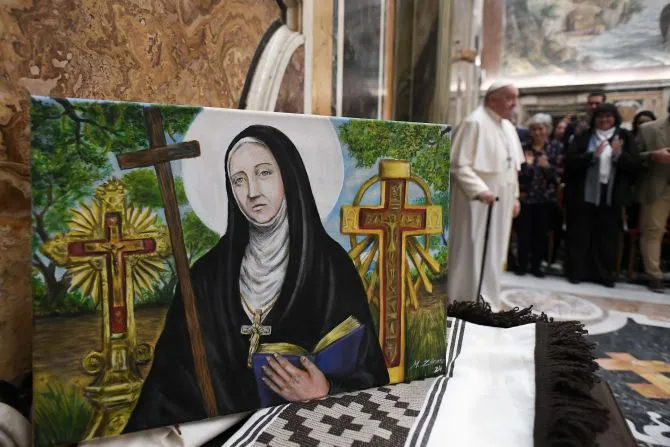
Pope Francis met with Argentine pilgrims on Friday morning ahead of the historic canonization of the county’s first female saint on Sunday.
During his address, Pope Francis presented Blessed María Antonia of St. Joseph de Paz y Figueroa, more affectionately known as “Mama Antula,” as an example of “charity” and “an inspiration that revives ‘the option for the last, for those that society discards.’”
The saint’s example and legacy is especially important for us today “in the midst of this society that runs the risk of forgetting that ‘radical individualism is the most difficult virus to defeat. A virus that deceives. It makes us believe that everything consists of giving free rein to one’s own ambitions,’” the pope said, quoting from his encyclical Fratelli Tutti.
Born in 1730 in Silipica, Santiago del Estero, in northern Argentina, María Antonia’s early life was characterized by a fervent desire to serve God. She helped parents with the instruction of their children and administered care to the sick and poor.
Against the backdrop of the suppression of the Jesuits in the Spanish Empire by Charles III, the pope characterized María Antonia as an example of overcoming adversity as she traveled on foot to promote Ignatian spirituality and “to help everyone discover the beauty of following Jesus.”
The pope added that this was no small task given the “aversion that had developed toward Christ, the aversion that had developed toward the Jesuits.”
“She was forbidden to give retreats, so she decided to give them clandestinely. This dimension of clandestinity must not be forgotten,” Pope Francis stressed.
Arguing that it is imperative to not forget this secrecy, the pope told the pilgrims to “not to give up in the face of adversity, not to give up on our good intentions to bring the Gospel to all, despite the challenges.”
María Antonia is as an example of discernment “because she
had not placed her security in herself, but in God, trusting that her
arduous apostolate was his work,” the pope said.
